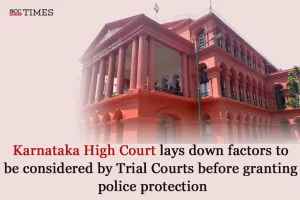Karnataka High Court: In a petition filed by the petitioner under Article 227 of the Constitution challenging the order passed by the Principal Senior Civil Judge & JMFC, Channarayapatna (‘Trial Court’), whereby the petitioner’s request for police protection to guard their properties was rejected, a Single Judge Bench of Vijaykumar A. Patil J.* stated that it is an inherent power of the Court under Section 151 of the Civil Procedure Code, 1908 (‘CPC’) to consider application for police protection of the property. The Court further laid down factors to be considered by the Trial Court before granting police protection.
Background
The petitioners filed a suit for permanent injunction against the respondents from interfering with the lawful possession and peaceful enjoyment of the suit schedule properties. Subsequently, the petitioners filed an interim application seeking temporary injunction, which was allowed in their favour. Later, the respondent challenged the aforesaid order which was dismissed for non-prosecution. However, subsequently it was restored with no interim order.
Meanwhile, the petitioners filed an application under Section 151 of the CPC seeking police protection over their respective possession of the suit schedule properties against the respondents. The affidavit filed along with the application indicated that the respondents wrongfully obstructed the vehicle of the petitioners which was carrying the coconuts, and tried to knock off the coconuts, but the petitioners managed to take away the same. It was also alleged that the respondents even formed unlawful assembly, trespassed the properties, created obstruction and stole coconuts stored in the petitioners’ godown. The affidavit also indicated that there was a constant interference from the respondents regarding the possession over the suit schedule properties in violation of the temporary injunction order.
The Trial Court found no allegation of serious threat of dispossession and rejected the application for police protection stating that the petitioners didn’t mention the purpose for seeking the same.
Analysis and Decision
After examining Karisiddamma v. Sanna Kenchamma, (2009) SCC OnLine Kar 345, Siddaramappa v. Talavar Rangappa, WP.No. 62970 of 2016 dated 27-2-2017, and Manjunath Reddy v. V. Nagarathna, 2014 SCC OnLine Kar 2392, the Court stated that consideration of the application filed for police protection before the Trial Court should be based on various factors like:
(a) The nature of temporary injunction order passed by the trial Court.
(b) The nature of police protection sought.
(c) The effect of granting and non-granting police protection.
(d) The prima facie case is made out for grant of police protection based on the pleading and material on record.
(e) The reasons shall be recorded while granting the police protection regarding consistent violation of the temporary injunction order and the need for police protection/aid.
(f) The fact that whether the temporary injunction order granted has attained finality and the application needs consideration even during the pendency of the appeal by recording the reasons for such urgency or otherwise.
(g) Police protection cannot be ordered mechanically, or on mere request.
(h) The exercise of power by the Trial Court to consider the application for police protection is an inherent power of the Court under Section 151 of the CPC.
(i) There is no impediment for the Trial Court to consider the application for police aid or protection merely because there is a remedy under Order 39 Rule 2A CPC.
The Court relied upon Meera Chauhan v. Harsh Bishnoi, (2007) 12 SCC 201 in which the Supreme Court of India reiterated the law laid down in Manohar Lal Chopra v. Rai Bahadur Rao Raja Seth Hiralal, 1961 SCC OnLine SC 17 and stated that the Court has the power to enforce its order of temporary injunction by providing police aid or police protection, though to be exercised in exceptional circumstances.
The Court observed that in the present case, the Trial Court had committed grave error in recording the finding that there were some aberrations of interference and rejected an application for police protection. The Trial Court had also come to conclusion that there was a violation of the temporary injunction order by the respondents, when that being so, the Trial Court ought to have directed the jurisdictional police to provide help whenever need arises.
Considering that there could not be continuous police protection/aid to guard the properties of the petitioners and that the same also could not be a ground to deny the police aid, the Court viewed that not providing police protection in such cases would give a ground for the respondents to defy the order of the temporary injunction granted by the Court.
The Court observed that there are exceptional circumstances in the case on hand and that police aid must be provided to implement the order of temporary injunction order granted by the Trial Court whenever need arises. Thus, the Court allowed the petition and stated that the police protection sought should remain in force till the temporary injunction order operated in favour of the petitioners.
[Balakrishna K.P. v. K.P. Puttaraju, 2025 SCC OnLine Kar 12654, decided on 7-7-2025]
*Order by Justice Vijaykumar A. Patil
Advocates who appeared in this case:
For the Petitioner: H.N. Shashidhara, Senior Counsel for H.S. Suhas
For the Respondent: Ramchandra R. Naik and M.B. Chandrachooda


